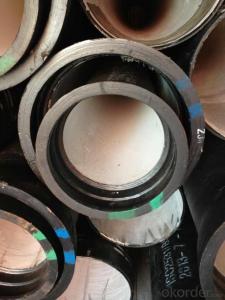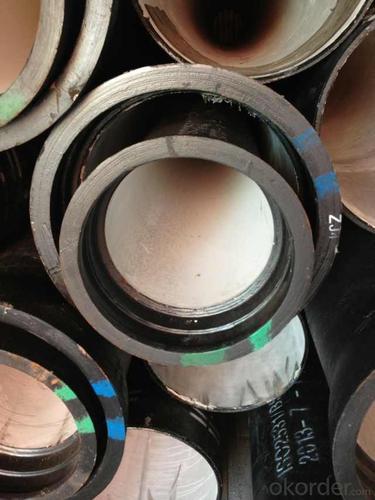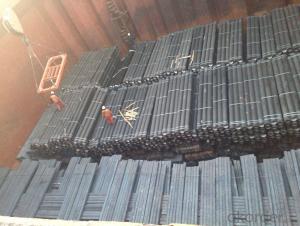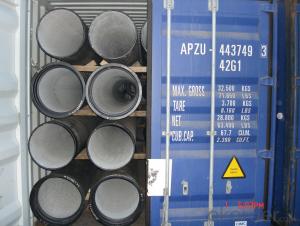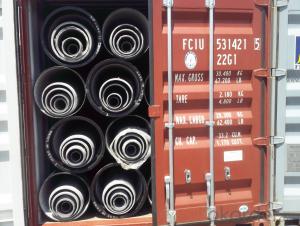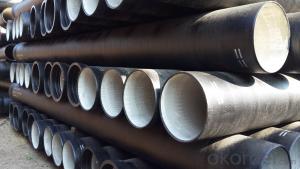DUCTILE IRON PIPE C DN350
- Loading Port:
- Tianjin
- Payment Terms:
- TT OR LC
- Min Order Qty:
- -
- Supply Capability:
- 30000Tons m/month
OKorder Service Pledge
OKorder Financial Service
You Might Also Like
CNBM ductile iron pipe ranges from DN80-DN1600mm (T-Type, Class K9), effective length 6m, comply with ISO2531 Standard
Company Profile
CNBM International Corporation is the leading production base and renowned supplier of Ductile Iron Water Pipe systems of both potable and waste water in China. We are constantly looking to develop high quality products to ensure the longest service life and wonderful performance.
CNBM Pipelines regard quality as the essential factor leading to successful business. Every pipe is tested in accordance with BS EN545 (water application) or BS EN598 (sewer application). CNBM Pipelines products comply with and are tested according to the relevant European and International Standards. Our pipes are manufactured under the quality management system BS EN ISO 9001. After years of efforts, CNBM Pipelines has built up great reputation in terms of quality and service among customers worldwide
Product Introduction
CNBM ductile iron pipe ranges from DN80-DN1600mm (Tyton, T-Type, Class K7/K8/K9), effective length: 6m, complying with BS EN545/EN598/ISO2531/BS4772.
Specification& Payment terms
Internal lining: Pipes shall have an internal cement mortar lining in acc with ISO4179.
External coating: Pipes shall be externally coated with metallic zinc spray plus a further layer of resin painting to ISO8179.
Gasket: 100% SBR/NBR/EPDM gasket in accordance with ISO4633.
Packing: Pipes from DN100 to DN300 be bundled with steel belts, the others are in bulk.
Payment term: By 30% T/T advance payment + 70% Irrevocable L/C at sight.
Packing: In bulk vessel or in container.
- Q: What is the lifespan of ductile iron pipes?
- The lifespan of ductile iron pipes can vary depending on various factors such as the quality of the pipes, the environment they are installed in, and the level of maintenance they receive. However, on average, ductile iron pipes have a lifespan of approximately 80-100 years.
- Q: How are ductile iron pipes protected against interior corrosion?
- Cement mortar lining is utilized to protect ductile iron pipes against interior corrosion. This process involves the application of a layer of cement mortar to the inner surface of the pipe. By acting as a protective barrier, the cement mortar prevents the corrosive elements in the water or fluid from directly contacting the iron material. To apply the cement mortar lining, the interior surface of the ductile iron pipe is initially prepared by removing any loose scale or debris. Next, a mixture of cement, sand, and water is prepared to create a paste-like consistency. Skilled workers can then manually apply this mixture to the interior surface of the pipe or use a spinning machine. Once the cement mortar lining is applied, it must cure for a specific period, typically around 24 hours. During this curing process, the cement mortar hardens and forms a dense protective layer on the pipe's inner surface. The cement mortar lining provides several advantages in safeguarding ductile iron pipes against corrosion. It creates a smooth and continuous surface that prevents direct contact between the water or fluid and the iron material, thus reducing the risk of corrosion. Additionally, the lining helps to minimize friction within the pipe, thereby enhancing flow efficiency. It is crucial to regularly inspect and maintain the cement mortar lining to ensure its effectiveness in preventing corrosion. Over time, the lining may develop cracks or deteriorate, compromising its protective properties. Therefore, periodic inspections are necessary to repair or replace the lining as required, ensuring the integrity of the ductile iron pipes and preventing interior corrosion.
- Q: Can ductile iron pipes be used for underground compressed air systems?
- Yes, ductile iron pipes can be used for underground compressed air systems. Ductile iron pipes have high strength and durability, making them suitable for various applications including underground installations. They are corrosion-resistant, which is essential for underground systems where moisture and other environmental factors can cause damage over time. Additionally, ductile iron pipes have the ability to withstand high pressure, making them a reliable choice for compressed air systems. However, it is important to ensure that the pipes are properly installed, with proper support and protection to prevent damage or leaks. Regular maintenance and inspection should also be conducted to ensure the longevity and efficiency of the underground compressed air system.
- Q: What are the disadvantages of using ductile iron pipe?
- Using ductile iron pipe comes with several disadvantages. To begin with, one major drawback is its cost. Ductile iron pipe tends to be pricier than alternative piping materials like PVC or traditional cast iron. This can make it less desirable for projects with tight budgets. Furthermore, ductile iron pipe is relatively heavy in comparison to other materials. This makes it more challenging to handle and install, requiring specialized equipment and additional labor. The weight also increases the risk of damage during transport and installation. Another disadvantage is its susceptibility to corrosion. While ductile iron is more resistant to corrosion than traditional cast iron, it is still prone to rust and deterioration over time. This can result in a reduced lifespan and potential leaks or pipe failures. In addition, ductile iron pipe has limited flexibility and is not as resistant to ground movement or settlement. This can lead to cracks or breaks in the pipe, especially in areas with unstable soil conditions or seismic activity. Finally, ductile iron pipe can have a rough interior surface, which can increase friction and decrease flow capacity. This results in higher pumping costs and decreased efficiency in fluid transportation. In conclusion, although ductile iron pipe offers advantages like strength and durability, it is important to carefully consider these drawbacks when selecting the appropriate piping material for a specific project.
- Q: What is the expected bedding and backfill requirements for ductile iron pipes?
- The expected bedding and backfill requirements for ductile iron pipes typically involve using a suitable bedding material, such as crushed stone, to provide support and stability to the pipe. This is followed by proper backfilling around the pipe with a granular material, such as sand or gravel, to protect the pipe from external loads and prevent damage. The specific requirements may vary based on factors such as soil conditions, pipe diameter, and depth of installation. It is important to consult relevant standards and guidelines to ensure proper installation and long-term performance of the ductile iron pipes.
- Q: Can ductile iron pipe be used for wastewater treatment plant applications?
- Ductile iron pipe is indeed applicable for wastewater treatment plant purposes. Its suitability stems from several properties it possesses. Firstly, its high resistance to corrosion is crucial in such plants, where the presence of chemicals and water can cause pipe rust and degradation. Moreover, its high tensile strength and durability enable it to withstand the demands of wastewater treatment processes. Furthermore, its flexibility facilitates easy installation and maintenance within intricate wastewater treatment systems. In conclusion, ductile iron pipe is a dependable and cost-effective option for wastewater treatment plant applications.
- Q: How are ductile iron pipes joined to fittings and valves?
- Ductile iron pipes are typically joined to fittings and valves using mechanical joint or push-on joint methods. The mechanical joint involves using a gland and a rubber gasket to create a tight seal when the pipe is bolted to the fitting or valve. On the other hand, push-on joint method uses a rubber gasket that is compressed when the pipe is pushed into the fitting or valve, providing a secure connection without the need for bolts or additional hardware.
- Q: Can ductile iron pipes be used for both water and sewer applications?
- Yes, ductile iron pipes can be used for both water and sewer applications. Ductile iron pipes have excellent strength, durability, and corrosion resistance, making them suitable for carrying both water and sewage. They are commonly used in various water supply and wastewater systems due to their ability to withstand high pressure and resist chemical reactions caused by sewage.
- Q: Can ductile iron pipes be used for underground cable conduits?
- Ductile iron pipes are well-suited for underground cable conduits. They possess strength, durability, and corrosion resistance, making them suitable for a range of applications, including underground cable conduits. These pipes can handle heavy loads and safeguard cables against external elements. Furthermore, their long lifespan minimizes the need for frequent replacements and maintenance. Nonetheless, it is vital to consider factors like burial depth, soil conditions, and specific cable installation requirements when selecting ductile iron pipes for underground cable conduits.
- Q: Can ductile iron pipes be used in areas with high water velocity?
- Yes, ductile iron pipes can be used in areas with high water velocity. Ductile iron pipes are known for their strength and durability, making them suitable for handling high water velocities and pressures. They have a high resistance to corrosion and can withstand the forces generated by fast-moving water. Additionally, ductile iron pipes are designed to have smooth internal surfaces, which helps in reducing friction and minimizing the impact of high water velocity on the pipe. However, it is important to ensure proper installation and maintenance practices to maximize the performance and longevity of the ductile iron pipes in high water velocity areas.
Send your message to us
DUCTILE IRON PIPE C DN350
- Loading Port:
- Tianjin
- Payment Terms:
- TT OR LC
- Min Order Qty:
- -
- Supply Capability:
- 30000Tons m/month
OKorder Service Pledge
OKorder Financial Service
Similar products
Hot products
Hot Searches
Related keywords
